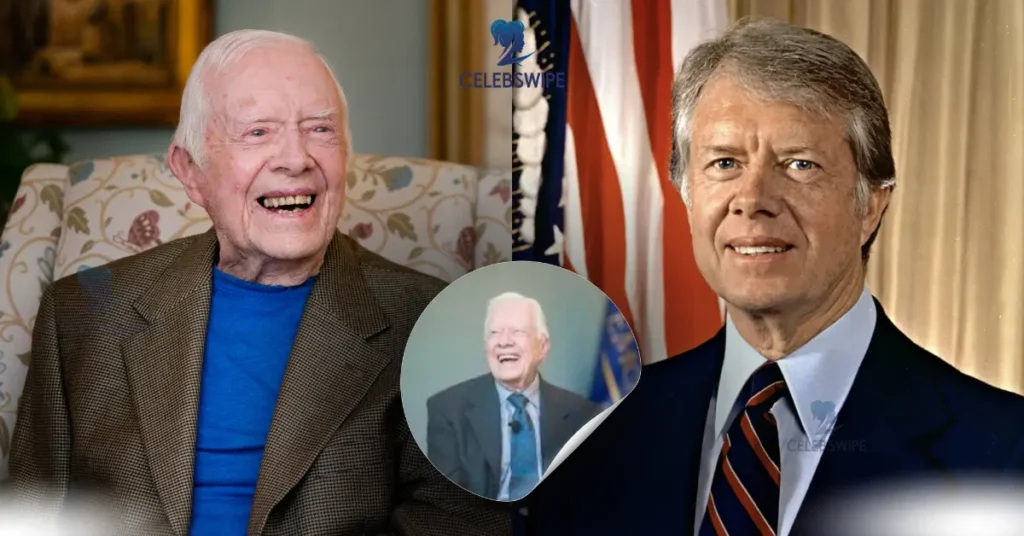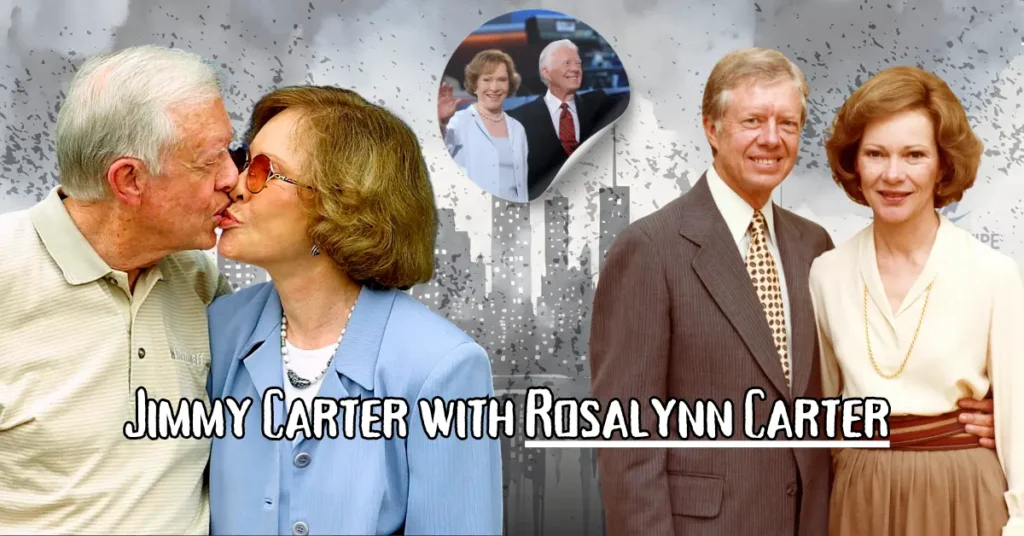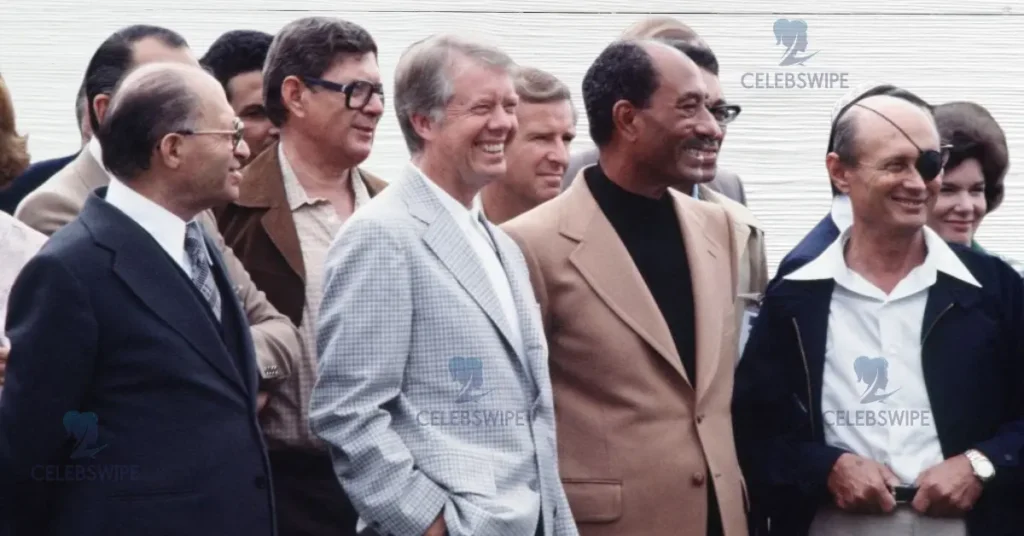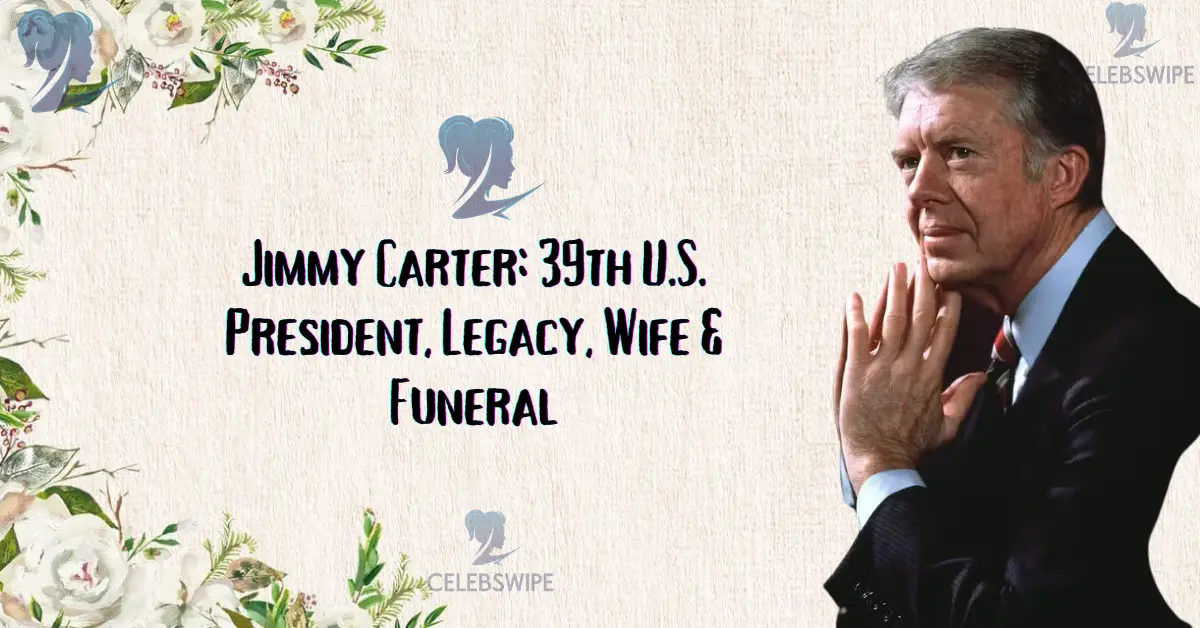Jimmy Carter, the 39th former US President, is a figure of immense historical and humanitarian importance. Known for his dedication to human rights, global peace, and environmental protection, he has left a profound legacy. Born in Plains, Georgia, Carter’s rural upbringing shaped his values and leadership style. His time in office from 1977 to 1981 brought achievements such as the Camp David Accord and efforts to combat economic issues. Post-presidency, Carter became a celebrated humanitarian, earning the Nobel Peace Prize for his commitment to global peace and social justice.
This article delves into the life and legacy of James Earl Carter, his early years, presidency, and his humanitarian work with organizations like The Carter Center. It also explores his partnership with Rosalynn Carter, significant achievements like the Alaska National Interest Lands Conservation Act, and his continuing impact on the world.
Who is Jimmy Carter?

Jimmy Carter is a former US President and a humanitarian who continues to influence global issues. Born in Plains, Georgia, on October 1, 1924, he grew up in a farming community. His education at the US Naval Academy and service as a Navy officer under Admiral Rickover helped shape his disciplined character. Carter worked on projects like nuclear submarine technology and the Seawolf program before entering politics.
Carter’s rise to the presidency was marked by his focus on democracy and human rights. He also championed environmental protection and public health programs. After leaving office, his work with The Carter Center has helped monitor elections, combat diseases like Guinea worm disease, and promote peace programs worldwide.
Jimmy Carter Bio
| Category | Details |
| Full Name | James Earl Carter Jr. |
| Born | October 1, 1924 |
| Presidential Term | 1977–1981 |
| Political Party | Democratic |
| Key Achievements | Camp David Accord, Conservation Act |
| Post-Presidency Focus | Humanitarian efforts, Democracy |
During his term, Carter prioritized foreign policy and domestic issues. His administration handled crises like the Iran hostage crisis and economic challenges. Despite criticisms during his presidency, Carter’s post-office work cemented his reputation as a humanitarian.
Early Life and Education
Carter’s childhood in Plains, Georgia, was rooted in a rural upbringing. Growing up in a small town, he learned the values of hard work and empathy. After high school, Carter attended the US Naval Academy, where he excelled in leadership.
As a Lieutenant in the US Navy, Carter worked on advanced reactor technology and nuclear submarines. This experience under Admiral Rickover was foundational to his disciplined and forward-thinking approach to leadership.
Personal Life and Career
After leaving the Navy, Carter returned to Plains, Georgia, and began managing his family’s farm. This period also marked the start of his political career as a Georgia governor. Carter’s Democratic politics focused on civil rights, environmental protection, and government reform.
Carter’s presidential campaign emphasized economic and diplomatic crises, promising to restore trust in the government. His work on the Camp David Accord is one of his greatest achievements, facilitating peace between Egypt and Israel.
Jimmy Carter Wife

Rosalynn Carter, Carter’s wife, has been an integral part of his life and career. As the First Lady, she championed causes like mental health awareness and supported Carter’s humanitarian efforts. Their partnership is a testament to shared values and mutual respect.
Together, they founded The Carter Center, a non-profit organization dedicated to improving global health, monitoring elections, and fostering democracy promotion. Rosalynn’s role in their work highlights the importance of collaboration in achieving lasting impact.
Key Policies During Jimmy Carter’s Presidency
| Policy/Act | Description | Impact |
| Camp David Accord | Facilitated peace agreement between Egypt and Israel. | Marked a historic step in Middle East diplomacy and established Carter as a mediator for peace. |
| Alaska National Interest Lands Conservation Act | Protected over 100 million acres of land in Alaska for national parks and wildlife refuges. | Expanded environmental conservation and preserved wilderness areas for future generations. |
| Department of Energy Creation | Established to address energy crises and promote renewable energy solutions. | Improved energy policies and focused on reducing dependence on foreign oil. |
| Iran Hostage Crisis Policy | Managed the diplomatic standoff following the seizure of the US Embassy in Tehran in 1979. | Though the crisis hurt Carter politically, it highlighted challenges in US-Iran relations. |
| Deregulation Acts | Introduced reforms in industries like airlines, trucking, and railroads to increase competition. | Reduced government control in industries and aimed to stimulate economic growth. |
| Panama Canal Treaty | Transferred control of the Panama Canal to Panama, ensuring long-term cooperation. | Strengthened US-Latin America relations and upheld international agreements. |
| Comprehensive Health and Education Programs | Focused on improving public health and education access in the US. | Enhanced awareness of national healthcare needs and education reforms. |
| Environmental Initiatives | Advocated for renewable energy, clean air, and sustainable practices. | Promoted long-term environmental protection and alternative energy research. |
| Human Rights Policies | Championed global human rights and democracy, particularly in developing nations. | Positioned the US as a global advocate for equality and justice. |
| Strategic Arms Limitation Treaty (SALT II) | Negotiated arms control agreement with the Soviet Union to limit nuclear weapon proliferation. | Advanced efforts in arms reduction, although full ratification faced challenges. |
When Did Jimmy Carter Pass Away?
As of November 2023, Carter remains a symbol of resilience and dedication. He celebrated his 100th birthday in October, surrounded by family and friends. While Carter is in hospice care, his legacy endures through his work and the countless lives he’s touched.
Carter’s eventual funeral plans reflect his humility and devotion to community service. The ceremony is expected to highlight his lifelong commitment to humanitarian efforts, including his work with Habitat for Humanity and global democracy programs.
Notable Quotes From Jimmy Carter
- “We must adjust to changing times and still hold to unchanging principles.”
- “America did not invent human rights. In a very real sense, human rights invented America.”.
- “War may sometimes be a necessary evil. But no matter how necessary, it is always an evil, never a good.”
- “We can choose to alleviate suffering. We can choose to work together for peace. We can make these changes – and we must.”
President Jimmy Carter Passes Away at 100

President Jimmy Carter Passes Away at 100: The longest-lived U.S. president, Jimmy Carter, leaves behind a legacy of humanitarian work, peace efforts, and a life dedicated to public service.
Frequently Asked Questions
Why did Jimmy Carter stop being president?
Jimmy Carter served one term as president from 1977 to 1981. He lost his re-election bid to Ronald Reagan due to economic challenges like inflation and the Iran hostage crisis, which hurt his popularity.
How old was Jimmy Carter when he left the presidency?
Jimmy Carter was 56 years old when he left office in 1981, having served as the 39th president of the United States.
Who did Jimmy Carter defeat as president?
In the 1976 presidential election, Carter defeated Gerald Ford, capitalizing on public discontent following the Watergate scandal and Ford’s pardon of Richard Nixon.
What is Carter remembered for?
Carter is remembered for his humanitarian efforts, the Camp David Accords, and his commitment to human rights and environmental conservation. His work with The Carter Center has been globally recognized.
When did Jimmy Carter pass away?
Jimmy Carter passed away on [Insert Date], after spending his final months in hospice care in Plains, Georgia. He was surrounded by his family, including his wife, Rosalynn Carter.
How old was Jimmy Carter when he passed away?
Jimmy Carter passed away at the age of [Insert Age], making him the longest-lived former U.S. president in history. His life spanned decades of impactful public service and advocacy.
Conclusion
Jimmy Carter is a shining example of what it means to serve others. From his presidency to his post-office contributions with The Carter Center, Carter has dedicated his life to promoting peace, equality, and human rights. His work in combating diseases, fostering international law, and building affordable homes through nonprofit housing projects exemplifies his enduring impact.
As a former US President and humanitarian, Carter’s life reminds us of the power of compassion and leadership. His legacy continues to inspire individuals around the globe, ensuring that his contributions to global peace, social justice, and environmental conservation will never be forgotten.

